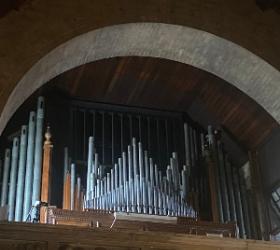
Marik's palms were wet. "I've got to stop wiping them on my trousers," he thought. "I'm making dark streaks that will draw attention."
He resisted the temptation to look behind him, to allow his eyes their freedom. If I'm caught, it will mean reprogramming at best, but more likely de-programming--the government euphe-mism for execution. How could he be sure his contact, "Drem," was not a government agent? They had met at a contempservice, their conversation touching on music styles and evolving into the realization that they agreed this type of service was shallow, meaningless entertainment designed as an extension of the Virtual Life program in which they'd been immersed since infancy.
Drem had cautiously hinted that a fragment of extinct music could still be heard, either as part of a religious service itself in which one could participate, or as what he referred to as "legitimate" music without religious connotations. Drem mentioned meaningless terms such as "baroque," "classical," "romantic." But the most exciting allusion was to an instrument he called a "pipe organ," which was claimed to produce this fossil music. Marik gathered that it was manipulated by keys, using hands and feet, rather than by computer-read brain waves as all other communication and music was done now. He had searched the archives at the Praise Library but found no reference to such an instrument, and of course since The Burning, there was no other historical source.
"You mean there used to be something other than praise bands?" Marik had asked incredulously.
"Yes, there were dignified gatherings where people would distance themselves from the secular, worshipping with awe and respect. These assemblies were presided over by a person with theological credentials. They met in edifices different from a home, school or nightclub. Many of these buildings were of substantial size and of refined and artful design, and were places which brought people away from the spoon-fed entertainment of--at the time--television or other slickly-produced shows. Coupled with differing amounts of ritual and supported by a pipe organ and often a choir and congregational singing, mere presence in such a place could inspire many feelings, perhaps different for each person, but which were manifestations of an awareness of the omnipotence and mystery of God. How different from a service which is an extension of everyday life! The organ was an integral part of most Protestant and Catholic churches in the western world. Its power spoke of God's might; its sweetness, of gentleness and compassion."
*
They had met a few more times at the contempservice, Marik each time quietly and discreetly asking about pipe organs. Finally, after a pause during which he seemed to struggle with some internal thoughts, Drem whispered, "One organ remains. If you'll swear to secrecy, I'll take you to hear it."
So, Marik thought, here he was, in an industrial area of the city, late at night in the rain. The noise and vibration of machines at a nearby factory running a second shift gave truth to its claim to produce "custom metal stampings." Several minutes early, Marik found the street corner given in the instructions, and shrank back into a doorway to escape the rain and the orange light from the lumospheres orbiting above the city.
*
Drem was nervous. There was a big risk in bringing new people underground. He had been warned by veterans to let the Board run clearance checks on prospective visitors, but he was quite certain that Marik was okay, so had skipped that part. There was, of course, the risk of being spotted and followed by agents or their informers, but you took that chance any time you went under.
He made his way against the wind-whipped sting of the rain, keeping close to the buildings and walking at moderate speed to avoid seeming either to loiter or to hurry. He arrived at the prescribed corner and was almost relieved when he didn't see Marik. Maybe it was just as well if this didn't go through. Then a trickle of cold water ran down the back of his neck, combining with the "Over here!" hissed from Marik's doorway to make him jump.
"Walk beside me," Drem ordered without ceremony. They walked several blocks in silence, made two turns, doubled back a block and then, beside a vacant building, descended a set of concrete steps littered with debris and protected by a broken and rusting pipe railing. Drem produced a flashlight and they progressed through a series of doorways, damp rooms, passageways and more steps--always down.
At one point they stopped to shed their rain gear, during which time Drem had explained that the "catacomb organ" location was in this noisy manufacturing area to help mask sound vibrations from the instrument. There was still the threat that sophisticated seismic detection equipment with filters could probably pick it up, so they had devised a method that, when the organ was played, the sound was electronically played back out of phase in the external areas of the vault to cancel its transmission through the ground.
They continued on, and after they had passed several places where there was a choice of direction, Marik realized with a shock that he was dependent upon Drem to lead him out of this place. Finally they came to a substantial steel door, where Drem placed the palm of his hand on a wall-mounted touch pad. After a few moments there was a soft click and the door opened into a lighted, heated room with auditorium seating. Marik noted that about a fourth of the seats were occupied, mostly by gray-haired people.
The focal point of the room was a massive keyboard console. Pipes rose from wooden boxes, some within enclosures, and filled the background.
So this was a pipe organ!
A man was just taking a seat at the console. Without speaking, Drem signaled Marik to take a seat. In a moment the man began to play.
He played for an hour.
*
People wept.




